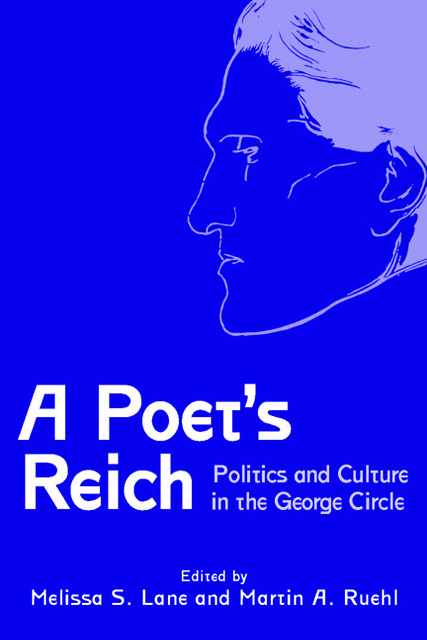12 - The George Circle and National Socialism
Published online by Cambridge University Press: 10 February 2023
Summary
Stefan George Declared Himself a revolutionary. When Ernst Robert Curtius visited him on 16 April 1911, George remarked: “Manche meinen, in meinen Büchern sei nur Künstlerisches enthalten, nicht der Wille zum neuen Menschlichen. Ganz falsch! Algabal ist ein revolutionäres Buch.” In 1919, again in conversation with Curtius, George described his books as prophetic, explaining that Geist always found the necessary solutions first, and that events lagged behind. But which solutions did George have in mind, and which events might be said to have resulted from them? Did he call for “spirits from the vasty deep,” and did they come? Were these solutions, as certain terminological congruences suggest, proto- or para-National Socialist? Were they völkisch and antisemitic?
George’s own statements on these points are not numerous, but rather conclusive. If it is accepted that the Master controlled, authorized, and authenticated the principal published utterances of his friends, and if it is accepted that his friends could not be friends unless they essentially represented his views, then the most prominent examples of these views will be sufficiently representative. They reveal affinities between the ideas of the George Circle and völkisch nationalism; between George’s claim to political leadership and the Führer principle; and they point up shared assumptions regarding racial discrimination. They have to be set in the context of those remarks made by members of the Circle that highlight the fundamental differences between the views espoused in the Circle and those of National Socialism as well as the völkisch and antisemitic movements.
George and Völkisch Nationalism
The term völkisch occurred in the fifteenth century as a simple translation of popularis, but in 1811 Johann Gottlieb Fichte gave it a radical political meaning: “deutsch heiszt schon der Wortbedeutung nach völkisch” and, based on his own Wissenschaftslehre, “Der eigene und selbständige Grundmensch ist ein Deutscher; der als Nachbild eines andern lebendigen Seins in der Mitwelt oder Vorwelt Gebildete ist ein Fremder, Glied eines Ganzen, in welchem er nicht ist, oder welches vielleicht überhaupt nicht mehr ist.” A person of non-German descent thus was not völkisch but volksfremd.
- Type
- Chapter
- Information
- A Poet's ReichPolitics and Culture in the George Circle, pp. 287 - 316Publisher: Boydell & BrewerPrint publication year: 2011

